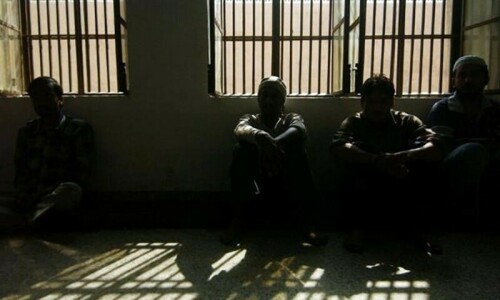Global credit rating agency Fitch on Monday upgraded Pakistan’s long-term foreign-currency issuer default rating (IDR) to CCC+ from CCC on the back of the country’s deal with the International Monetary Fund (IMF), a statement from the agency confirmed.
According to Fitch, a CCC rating is a speculative or junk grade indicating the issuer has a high risk of defaulting on its debt obligations.
Last year, the agency had upgraded Pakistan’s long-term foreign currency issuer default rating from ‘CCC-’ to ‘CCC’ in July, following the approval of an IMF loan. However, the rating had still indicated a significant country credit risk.
“The upgrade reflects greater certainty over the continued availability of external funding, in the context of Pakistan’s staff-level agreement (SLA) with the IMF on a new 37-month $7 billion extended fund facility (EFF),” the agency said on Monday.
Pakistan and the IMF reached a three-year, $7 billion aid package deal on July 12 2024, giving much-needed respite to the nation.
The new programme, which needs to be validated by the Fund’s Executive Board, should enable Pakistan to “cement macroeconomic stability and create conditions for stronger, more inclusive and resilient growth”, according to the IMF.
Fitch highlighted that the effective performance of the government in the previous IMF agreement helped the country “narrow fiscal deficits and rebuild foreign exchange (FX) reserves, and further improvements are likely”.
However, it noted that the country would be vulnerable if it failed to “implement challenging reforms”.
The agency also said that it assumed that by the end of August, the government will have to “obtain new funding assurances from bilateral partners, chiefly Saudi Arabia, the UAE, and China”, which would total about $4bn to 5bn for the agreement.
“We believe this will be achievable, given the strong past record of support and significant policy measures in the recent budget for the fiscal year ending June 2025 (FY25),” it said.
Fitch further noted the ambitious reforms by the government, adding that it aimed to “tackle longstanding structural weaknesses in Pakistan’s tax system, energy sector and state-owned enterprises, alongside a commitment to exchange rate flexibility and improvements in the monetary policy framework”.
It also commended the government target of a 3 per cent increase in tax-to-GDP “from under 9pc in FY24, including through higher taxes on the country’s influential agricultural sector, which will have to be legislated at the provincial level”.
Reserves still low despite recovery
Fitch also noted that although the country’s foreign exchange reserves (FX) have recovered, they still remained low.
It highlighted that the State Bank of Pakistan (SBP) “is rebuilding FX reserves amid inflows of new funding and limited CADs [Current Account Deficit]”.
“We estimate official gross reserves, including gold, rose to over $15 billion at June 2024 (about three months of imports), from nearly $10 billion at end-June 2023,” it said, adding that the agency expected “them to rise to nearly $22 billion by FY26, close their 2021 peak”.
PM hails upgrade
Prime Minister Shehbaz Sharif hailed the upgrade and appreciated the efforts of Finance Minister Muhammad Aurangzeb and his team.
The prime minister said the country and the nation had begun receiving the fruits of the government’s policy of sacrificing politics for the sake of the state in the shape of improvement in the country’s economy.
In a statement, he said the upgrade was the international recognition of the government’s right economic policies.
PM Shehbaz emphasised that the government was working hard on the economic reforms agenda, the fruits of which would reach the people soon.
“The reports of Fitch and other international financial institutions are important for the economic improvement of Pakistan,” PM Shehbaz said adding that “we will move forward with more effort and passion on the path of economic improvement of the country.”
He hoped that the new IMF programme would further improve economic activities in the country.
The announcement of another one per cent reduction in the interest rate by the State Bank of Pakistan was another sign of economic improvement, he added.
He said that the recent cut in the interest rate would further reduce inflation and increase business activities.














































